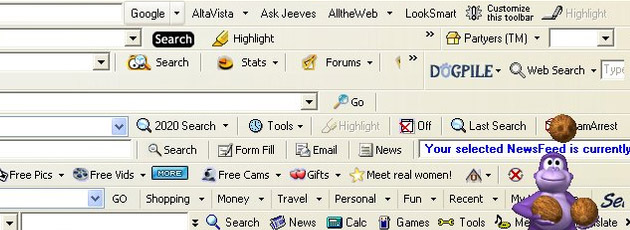Archive for November, 2008:
Why I Still Use DOS
For some of you, the thought of DOS probably brings back horrifying memories of things like IRQ conflicts, MSCDEX, the config.sys, himem.sys, etc. Those days are over, but the best aspects of DOS remain a part of Windows, fortunately.
Knowledge of DOS has been critical to my geeky endeavors over the last dozen or so years. Back in the nineties, as the GUI became pervasive and people seemed to have completely forgotten the command-line altogether, I continued to use it for a wide range of tasks. Yes, part of the reason I haven’t “let go” of DOS is in part nostalgic. The other part is that it has in fact been and remains very useful. Especially in troubleshooting and fixing low level problems that can’t be solved any other way.
So, you’re wondering what I could possibly have used DOS to accomplish? These days, for most things DOS can do, there is usually a free or paid application for Windows that does the same thing a little easier. Thing is, knowing how to do various tasks in DOS can help you repair Windows and perform a whole host of other tasks a lot quicker and often more efficiently than installing a bunch of different programs.
Why I Still Avoid Windows Vista’s UAC
I remember beta testing Windows 95 when it was code-named Chicago. Back then, I was running MS DOS 6.22 and running Microsoft Windows for Workgroups 3.11. I also beta tested numerous versions of Windows 98 when it was codenamed Memphis, Windows 2000, Windows XP, which brings us to this century where I beta tested so many versions of Microsoft Windows Vista (or, Longhorn) that I can’t even recall. I watched as Microsoft scrambled to try to meet the security disaster that were plaguing Windows XP. Some of you may not recall, but Windows XP was such a disaster in terms of security that it was rare to find a computer running a default copy of Windows XP, without a ridiculous infestation of spyware of some kind.
Back in the DOS days, I rarely used Windows 3.11 for hardly anything. I would use DOS to copy files, defragment my computer, browse BBSs, send e-mails, write batch scripts, just about everything. In fact, even when I switched over to using Windows more often I would still go back to DOS to do simple copy commands because it was easier for me to just write out the commands longhand. I used a hex editor to check executables for viruses because I didn’t have any antivirus software at the time. I guess my point is that Microsoft has had more than enough time to make a working security model for Windows.
HP Pavilion TX2500 Review
I have recently replaced my TX1000 with a TX2500 and despite a few little hiccups during the setup, I am very impressed with the improvements.The TX2500 is solid, light and sports a real touchscreen with wacom pen. Battery life is quite good and I recommend setting the power mode to “Balanced” rather than the standard “HP Recommended” that ships with the unit and manually adjusting the screen brightness to your tastes.
Physically, the TX2500 varies very little from the TX1000, where the major improvements lie are in the touchscreen and performance. My feeling about the TX1000 was that it was drastically underpowered and not up for the challenge of running Vista. The TX2500, however, feels powerful, balanced, and runs cool to boot.
PC ER: Loud Pop Followed By System Failure
Symptoms:
PC emits very loud “pop” noise four times over a span of 5 months yet everything is working fine. Suddenly, without warning, the computer shuts off completely. Upon reboot, the system barely passes POST (Power On Self Test, or BIOS (Basic Input Output System)) without shutting off again. I receive a frantic phone call. “What’s wrong? Why doesn’t the computer turn on anymore? I didn’t do anything!”
System Background:
This is a system that I built for a law firm, no fancy components were necessary except for the RAID 1 for backup in the event of a hard drive failure.Most of the components were new and in excellent condition.

